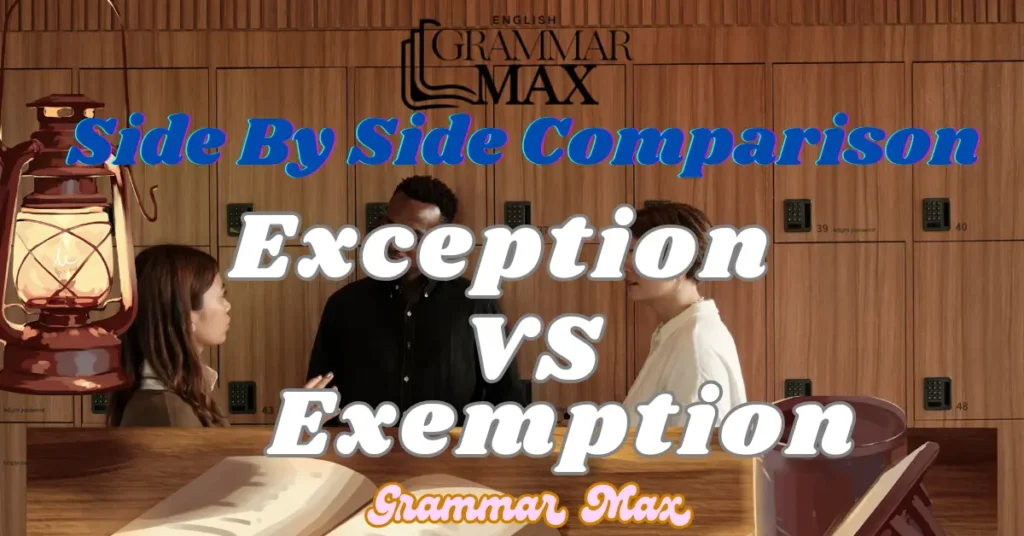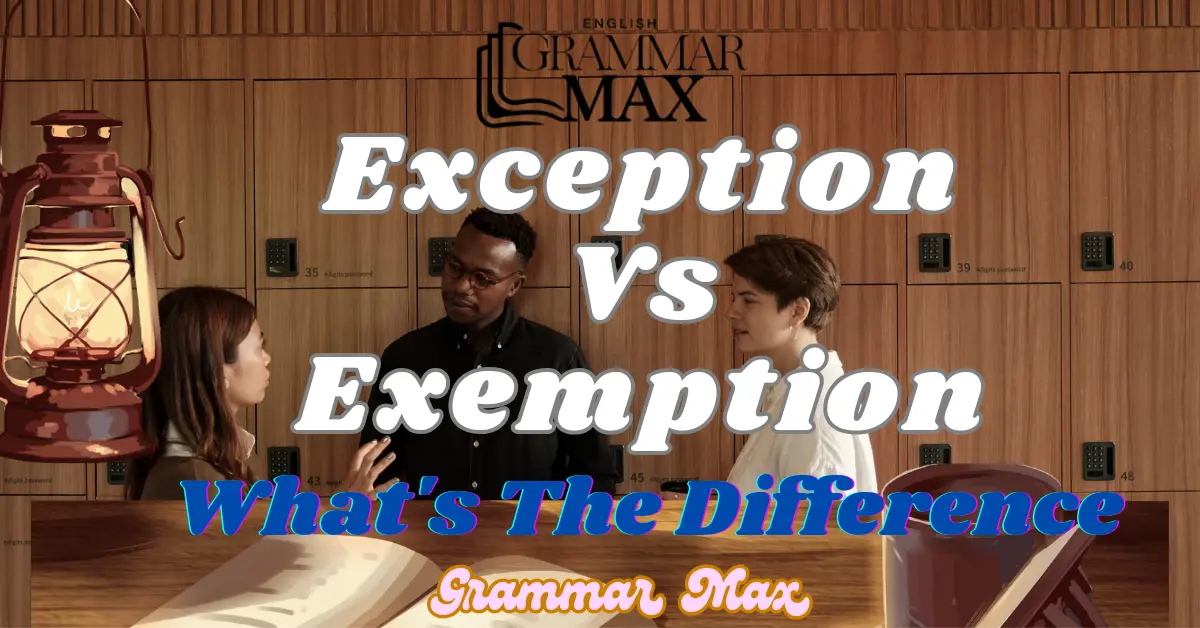When it comes to understanding exception vs exemption, it’s easy to mix them up. While both deal with being excluded from something, their meanings are distinct. An exception refers to a specific case that doesn’t follow a general rule, whereas an exemption means being released from an obligation, such as taxes or duties.
We’ll learn more about their definitions, usage, and examples to clarify these terms for better communication precision.
Understanding Exception And Exemption
Both exceptions and exemptions involve deviations from norms, but the extent of that deviation differs. An exception allows for rule deviation in specific cases, keeping the rule intact. An exemption provides full or partial relief from a duty or obligation.
Knowing the key differences between these terms helps you navigate legal, administrative, and everyday situations with ease.
Define the Form: Noun, Adjective, or Verb
Both exception and exemption are primarily used as nouns.
- Exception: This word is a noun that signifies a case or instance that does not follow a general rule. For example, in the sentence “There is an exception to the rule,” “exception” is functioning as a noun.
- Exemption: Similar to “exception,” “exemption” is also a noun. It indicates the act of freeing someone from an obligation. For instance, in “He received an exemption from paying taxes,” “exemption” is used as a noun.
Both terms can also appear in other forms, such as adjectives, but they are most commonly recognized and used as nouns in standard English.
How to Learn These Words Easily
Learning the differences between exception and exemption can be straightforward with a few strategies:
- Contextual Learning: Try to read examples of both words in sentences. Understanding how they are used in context can clarify their meanings. For instance, encountering “exception” in legal documents or policies can help you grasp its implications.
- Visual Aids: Create charts or tables that outline their differences, such as the side-by-side comparison we provided. Visual representations can enhance memory retention.
- Use Mnemonics: Develop simple mnemonic devices to remember the meanings. For example, associate exception with “excludes” (both start with “ex”), and think of exemption as “exiting a requirement.”
- Practice with Scenarios: Formulate sentences or scenarios using both terms. This practical application helps reinforce their definitions and usage.
By employing these strategies, you can quickly grasp the nuances of exception vs exemption, enhancing your vocabulary and communication skills.
Exception: Definition and Usage
An exception is a temporary or specific instance where a general rule does not apply. It acknowledges the rule but creates an allowance for certain situations without negating the rule altogether.
Example: Most employees are required to work on holidays, but John was given an exception due to his seniority. In this case, the rule requiring employees to work on holidays remains, but John’s unique situation leads to a rule deviation.
Common Uses:
- Exception definition: A case where a rule is temporarily not applied.
- Exception usage: When a specific scenario allows bending the general rule without removing it.
- General rule and rule deviation: Exceptions are tied to deviations from these, allowing for flexibility in rare cases.
Additional Examples:
- The school has a strict no cell phone policy, but there is an exception for students participating in after-school activities.
- Due to severe weather, there was an exception made for the usual attendance requirements, allowing students to attend classes online.
Exemption: Definition and Usage
An exemption means being freed from an obligation that others are required to follow. This is often seen in legal or financial contexts, where someone is excused from a duty, such as taxes, fees, or other obligations.
Example: Non-profit organizations often receive a tax exemption to support their charitable work. Unlike exceptions, which apply to specific cases, an exemption fully or partially relieves the person or entity from the obligation.
Common Uses:
- Exemption definition: A complete or partial release from a requirement or duty.
- Exemption usage: Found in legal and tax situations where individuals or groups are excused from obligations.
- Freedom from obligation: An exemption frees one from having to comply with a rule or regulation.
Additional Examples:
- Families with multiple children may qualify for an exemption from certain school fees.
- Veterans often receive an exemption from property taxes, reflecting their service.
Side-by-Side Comparison

Understanding the difference between exception and exemption helps clarify when a rule is bent versus when it’s lifted entirely.
| Aspect | Exception | Exemption |
| Definition | A temporary deviation from a general rule. | Complete release from an obligation or duty. |
| Usage | Used when rules are bent for special cases without removing them. | Used to excuse someone or something from a rule. |
| Key Difference | Allows a specific instance to deviate from the rule. | Frees an individual or group from following the rule. |
| Rule Status | The rule remains in place but is adjusted for certain cases. | Rule or obligation is lifted completely for those eligible. |
Everyday Usage Examples
Here are some examples to better understand the use of exception vs exemption in daily language.
Exception Examples:
- The library usually closes at 6 PM, but there will be an exception this Friday, remaining open until 9 PM.
- The restaurant has a no-pets policy, but there is an exception for service animals.
- In the case of the marathon, there was an exception for runners with disabilities, allowing them to participate with assistance.
Exemption Examples:
- Individuals aged 65 and older may qualify for a tax exemption on their property taxes.
- Students with medical conditions can apply for an exemption from physical education classes.
- Certain low-income families can receive a utility exemption during winter months to alleviate their financial burden.
These examples show how exceptions and exemptions are applied in different contexts, making it easier to distinguish between temporary rule deviations and full obligation releases.
Frequently Asked Questions
What is the main difference between exception and exemption?
An exception allows a temporary deviation from a rule, while an exemption provides full or partial release from the obligation.
Can an exception be permanent?
No, exceptions are typically temporary and apply only to specific situations or cases.
Who qualifies for an exemption?
Eligibility for an exemption is often based on specific criteria, such as age, income level, or legal status.
Are exemptions always granted?
No, exemptions usually require approval or an application process to determine eligibility.
Can exceptions vs exemptions coexist?
Yes, exceptions vs exemptions can coexist in the same context, depending on the rules or regulations involved.
Conclusion
Understanding the difference between exception vs exemption is crucial in navigating various rules and obligations. An exception temporarily allows for a deviation from the norm, whereas an exemption fully releases someone from an obligation.
If you’re dealing with tax laws, work policies, or everyday rules, knowing when to use these terms can improve communication precision and help clarify responsibilities.
By mastering these concepts, you’ll be better equipped to handle situations where rules and obligations may or may not apply to you.

William Henry is a writer for Grammar Max, a blog that focuses on synonyms and phrases. He loves exploring the quirks of the English language and enjoys helping readers improve their vocabulary. William’s articles are easy to read, fun, and full of useful tips for anyone looking to better understand and use English. Whether you’re a student, a professional, or just someone interested in language, William’s writing on Grammar Max makes learning about words and their meanings simple and enjoyable.
